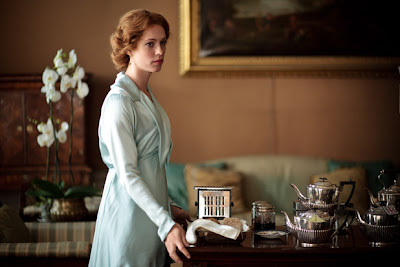 |
| Rebecca Hall as Sylvia Tietjens in "Parade's End" |
I recently had the pleasure of watching the enthralling period
drama “Parade’s End” produced by the BBC and HBO. (See the trailer here.) Written by Tom Stoppard from
the novels by Ford Maddox Ford, it had excellent credentials from the get-go,
and these were enhanced by the marvellous nuanced performances by the actors
involved. Benedict Cumberbatch (“Sherlock”) was a perfect Edward Tietjens, the moral,
upright Englishman who let the world think the worst of him rather than allow
the reputation of his volatile and sensuous wife Sylvia to be besmirched. And
the magnificent Rebecca Hall as Sylvia, a sharp-witted beauty who kicks over the
traces out of sheer boredom, desperate for her husband’s love and attention but
too perverse to allow herself to accept it.
This is yet another example of our culture’s
enduring fascination of the Edwardian era – the time between the death of Queen
Victoria in 1901 and the end of the First World War. In less than two decades,
Britain went through a dizzying period of changes, many of which were also
happening around the world.
Then, as now, there was a dramatic
acceleration of technology in daily life, particularly the widening use of the
telephone and the automobiles. And social changes were happening in every area
of life - women demanding the vote, the rise of the trade union movement, and the
introduction of social welfare legislation by the reforming Liberal government
of 1906, including the first national old age pension, free school meals, the National Health Insurance scheme, and
unemployment benefits. And all this was before the great disaster epic of the
First World War had even begun.
So it’s no wonder that the period has been mined
so extensively not only in literature but also in TV (The Forsythe Saga, the original Upstairs Downstairs, and of course Downton Abbey) and films (Howard’s End, The Shooting Party, The Wings of a Dove with Helena
Bonham-Carter, and Joseph Losey’s glorious The Go Between). The over-exposure of this era means that it can be hard to
avoid clichés – there are those who are tired of seeing or reading about yet
another stately home, suffragette march, or muddy trench. Which raises the
question of whether there is anything left to say about this period in British
history. Clearly, given that I am writing a novel set between 1911 and 1923, I’m hoping the answer is yes. After all, it’s not as if we put a limit on the number of novels that can be written about the present day. There are always new stories to be told of individuals caught up in the same events and against the same backdrop.
Ultimately, it comes down to whether the reader
is interested in my characters and what becomes of them. So it’s up to me to
make sure that the people in Albion’s Millennium are absorbing and true to life
whether they’re wearing jeans and a teeshirt or the enchantingly feminine
clothes of the Edwardian age.
No comments:
Post a Comment